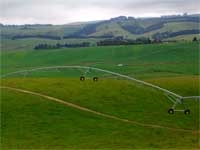Will we have enough water for farm irrigation by 2040?

The potential effect of climate change on river flows and future water supply for farm irrigation in Canterbury has been under scrutiny by NIWA scientists.
Using a river flow simulation model and focusing on the Rangitata catchment, we have been able to compare river flow under the current climate against a future climate scenario projected for 2040. We also examined the possible effects of climate change on weather elements like temperature and daily rainfall.
The 2040 climate scenario was based on a ‘middle of road’ emissions scenario and used the average values from 12 global climate models used for the recently published Intergovernmental Panel on Climate Change Fourth Assessment Report.
Our results project an increase in annual average temperatures of 1 °C for the region. Projected changes in annual average precipitation range from increases of up to 400 mm/year in the headwaters of the Rangitata River to little change on the Canterbury Plains.
Mean annual river flows are projected to increase by 8%. Monthly river flow is projected to increase or stay the same for 10 months of the year but reduce by 1–2 cumecs in December and January. Although the study focused on the Rangitata, our method could be applied anywhere in New Zealand.
The study was subcontracted to NIWA by Aqualinc Research and was funded by MAF.
